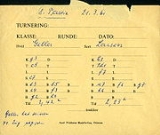
Chess terminology
Overview
Chess
Chess is a two-player board game played on a chessboard, a square-checkered board with 64 squares arranged in an eight-by-eight grid. It is one of the world's most popular games, played by millions of people worldwide at home, in clubs, online, by correspondence, and in tournaments.Each player...
in alphabetical order. Some of these have their own pages, like fork
Fork (chess)
In chess, a fork is a tactic that uses a single piece to attack multiple pieces at the same time. The attacker usually hopes to gain material by capturing one of the opponent's pieces. The defender often finds himself in a difficult position in which he cannot counter all threats. The attacking...
and pin
Pin (chess)
In chess, a pin is a situation brought on by an attacking piece in which a defending piece cannot move without exposing a more valuable defending piece on its other side to capture by the attacking piece...
. For a list of unorthodox chess pieces, see fairy chess piece
Fairy chess piece
A fairy chess piece or unorthodox chess piece is a piece analogous to a chess piece. It is not used in conventional chess, but is used in certain chess variants and some chess problems...
; for a list of terms specific to chess problems, see chess problem terminology
Chess problem terminology
This is a list of terms used in chess problems. For a list of unorthodox pieces used in chess problems, see fairy chess piece. For a list of terms used in chess is general, see chess terminology.- A :*Actual play - see post-key play....
; for a list of chess related games, see chess variants.
- A pinPin (chess)In chess, a pin is a situation brought on by an attacking piece in which a defending piece cannot move without exposing a more valuable defending piece on its other side to capture by the attacking piece...
against the kingKing (chess)In chess, the king is the most important piece. The object of the game is to trap the opponent's king so that its escape is not possible . If a player's king is threatened with capture, it is said to be in check, and the player must remove the threat of capture on the next move. If this cannot be...
, called absolute because the pinned piece cannot legally move as it would expose the king to check.
Unanswered Questions

